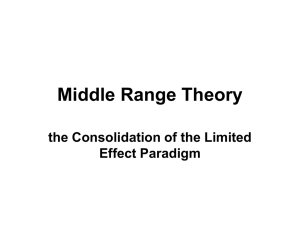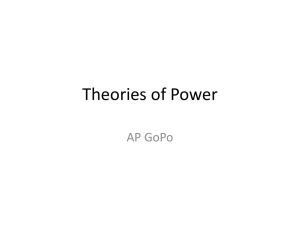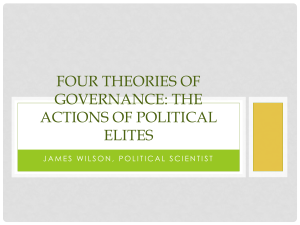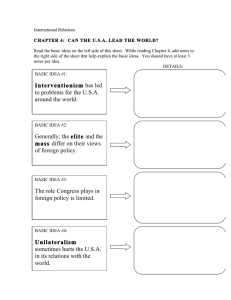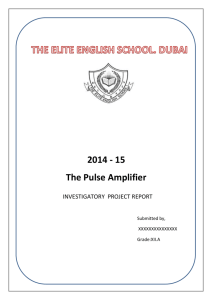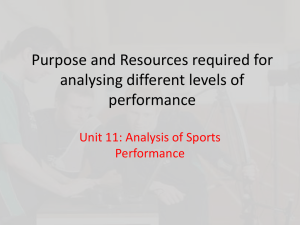The Texas Legislature Factors Inhibiting Democratic Pluralism 1. Constitutional Impediments
advertisement
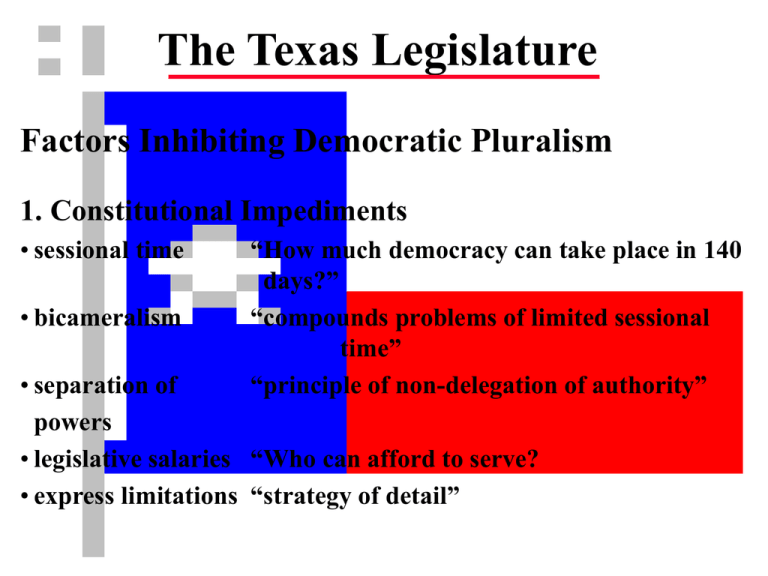
The Texas Legislature Factors Inhibiting Democratic Pluralism 1. Constitutional Impediments • sessional time • bicameralism “How much democracy can take place in 140 days?” “compounds problems of limited sessional time” “principle of non-delegation of authority” • separation of powers • legislative salaries “Who can afford to serve? • express limitations “strategy of detail” Factors Inhibiting Democratic Pluralism 2. Political Developments • no-partyism must be performed • concentration of leadership authority “power vacuum created - functions elsewhere” “legislature’s agenda is leadership’s agenda” Democratic Pluralism Pluralism contends that political power is widely distributed. No one group or person has a monopoly on it. Political decisions are mostly made openly in government institutions by officials representative of, and accountable to, the general public. With regard to political leaders, many things keep them close to the public: •Political leaders are plentiful. •Diversity, both in the social backgrounds and the issue orientations of the political elite, is quite pronounced. •Political leaders firmly believe in democratic values. adapted from Lamare, TEXAS POLITICS: ECONOMICS, POWER AND POLICY, pp. 4-9 Democratic Pluralism The masses also play a crucial role in pluralist theory; the elite are cognizant of the masses in a number of ways: •It is not difficult for the average person to join the ranks of political decision-makers. •Citizens control leadership behavior through the electoral process. •Citizens affect the political process through membership in interest groups. Democratic Pluralism The results of the mingling between leaders and the masses are these: •Political leaders make decisions based upon input from various groups and individuals. •Final decisions reflect the interests of a large and diverse section of the population. •A change in policy is often initiated by the masses or in anticipation of demands from the public. Economic Rule [Elitism] The economic rule model asserts that political power is concentrated in the hands of the top economic elite. Average citizens take a back seat to the economic elite in affecting and benefiting from public policy. The following points about the economic elite stand out: •Members of the economic elite are people who command the operations of major businesses. •Members of the elite see eye-to-eye on pecuniary matters. •The economic elite are united through many bonds [interlocking directorates, shared stock ownership, working business agreements, and social ties]. adapted from Lamare, TEXAS POLITICS: ECONOMICS, POWER AND POLICY, pp. 4-9 Economic Rule [Elitism] The interests of the economic elite are communicated to government in the following manner: •Initial selection of candidates for office is influenced by the economic sector. •The appointment of persons to government posts is also influenced by the economic elite. •Extensive lobbying of government by big businesses is common. •The structure of government institutions simplifies the corporate lobbying and campaign contribution process. Economic Rule [Elitism] The relationship between the dominant economic sector and political leadership yields the following results: •Public policy mostly reflects the interests of economic notables. •The masses exercise little control over the political process. •Changes in policy initiated by average citizens only stand a chance of success if the members of the elite adopt the cause. Models of Legislative Party Strength Party Functions Parliamentary Strong-Party Model U.S. Congress Weak-Party Model TX Legislature “No-Party” Model Organize Committee System YES YES NO Select Legislative Leadership YES YES NO Provide Voting Cues YES NO NO Formal Powers of the Texas Legislative Presiding Officers In the political leadership system: •Appointment of all chairpersons and vice-chairpersons of standing committees •[House] Removal of all chairpersons and vice-chairpersons of standing committees •[Senate] Appointment of all chairpersons and vice-chairpersons of standing subcommittees •[House] Appointment of Speaker pro tempore Formal Powers of the Texas Legislative Presiding Officers In the committee system: •Appointment of all members of standing committees •[Senate] Appointment of all members of standing subcommittees •Appointment of members of all select, conference, and interim study committees and their chairpersons and vice-chairpersons •Determination of the jurisdiction of committees, either ad hoc or through writing the rules Formal Powers of the Texas Legislative Presiding Officers In the system of rules and procedures: •Writing the rules •Application, interpretation, and enforcement of the rules through direction of staff and through control of the respective rules committee or subcommittee •Referral of all bills to standing committee •Presiding over the activities of the respective chambers, including recognizing members to speak •Scheduling of bills for floor debate [House] or recognizing members to move that bills be taken up out of order [Senate] •Full participation in the committee of the whole Proposals to Reform the Texas Legislature • Remove constitutional restrictions on sessional time [annual, open-ended] • Give the legislature the power to call itself into special session • Give the legislature the power to set/expand special session agendas • Reduce size the the House to no more than 100 members • Reduce the number of committees and committee assignments* • Reduce or remove formal powers of presiding officers@ • Increase legislative compensation • Increase legislative and committee staffing* • Provide single-member districts • Adopt joint rules between the chambers From THE SOMETIME GOVERNMENTS, a study produced by the Citizens Conference on State Legislatures meeting in Kansas City, 1971 *Wholly or partially adopted since 1971; remaining reforms [except @] would require constitutional amendment
